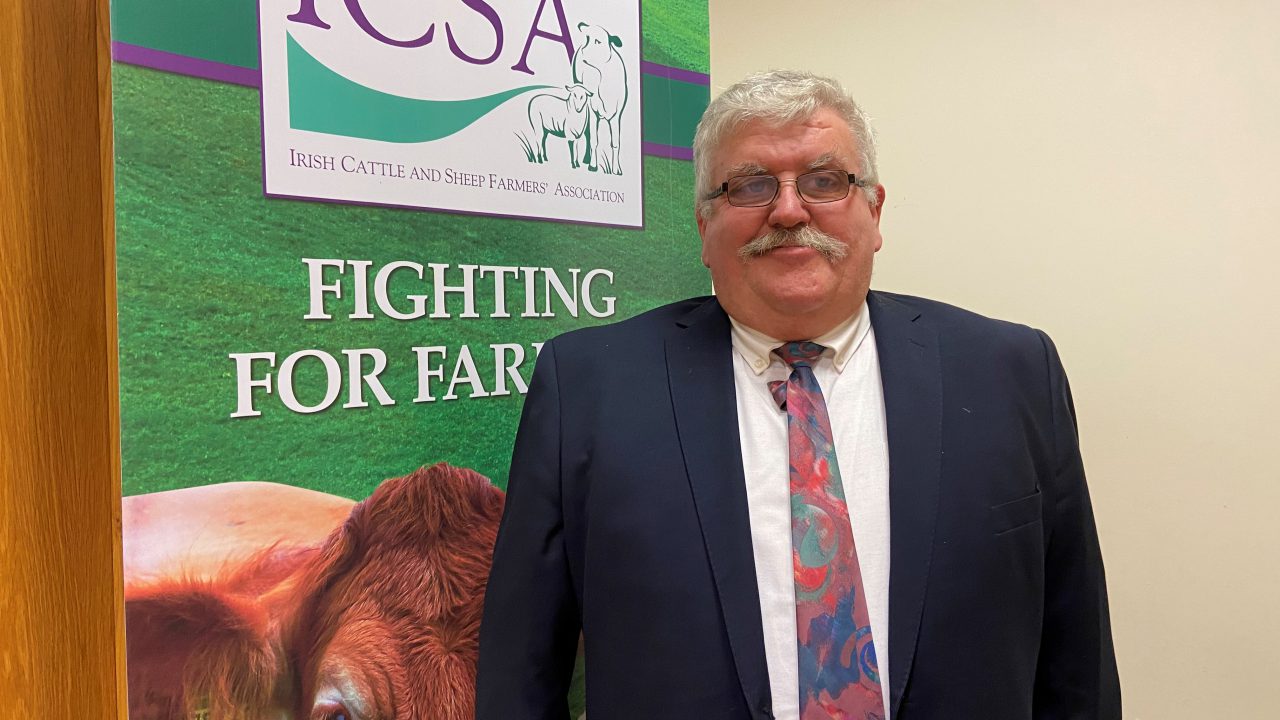As a provisional deal was reached today on the next Common Agricultural Policy (CAP), more reactions are filtering through this evening. For the Irish Cattle and Sheep Farmers’ Association (ICSA), what has been brokered so far “will see farmers do more for less”.
ICSA president, Dermot Kelleher, said the key issues around convergence to even out the ‘per-hectare payments’ and redistribution to support smaller farmers “reflect the fact that the budget is inadequate”.
“Similarly, the grandiose vision for an EU Green Deal – of which the agri-food sector is expected to do a lot of heavy lifting – is not matched by a suitably ambitious funding mechanism,” he said.
“Instead, many farmers will become even less viable due to direct payment cuts and will then be expected to devote many more hours to delivering public goods in the climate change and biodiversity spheres.”
“The 10% of payments to support small and medium farmers does not look so good when you realise that the money will predominantly be deducted from small and medium farmers in Ireland in the first place.
“I want to make it very clear that ICSA is fully behind any strategy that will increase funds for small and medium-scale farmers.
“We are unequivocal in supporting an absolute cap of €60,000 on payments with no wiggle room for those farms that are big enough to employ staff, in the context of a CAP where small-scale suckler and sheep farmers are being cut even at a current payment levels of €10,000.”
The ICSA president said that Ireland now has to face up to difficult choices in designing its own CAP plans.
“The ICSA has highlighted the fact that the cuts to CAP funding and the changes in schemes have led to the bizarre scenario where the Pillar 1 payment for a dairy farmer is, on average, greater than for a suckler farmer (2019 Teagasc National Farm Survey). This cannot be right when we look at the comparative incomes per hectare.
“We also have to get real about environmental ambition. A pilot agri-environment scheme offering about €4,000 net to a farmer tells you all you need to know.
“Almost 20 years ago, farmers were getting double this in REPS. So, all this talk of ecology is actually codology, if the farm is not helped to be viable”.
“A bad deal for Irish farmers” is how the Irish Farmers Association (IFA) put it, with president Tim Cullinane saying that the “combined effects of the proposal will decimate a cohort of farmers in Ireland”.
“The Irish government will also have to make good on its commitment for national co-financing, and on the €1.5 billion from the carbon tax in order to protect the viability of tens of thousands of farmers,” he said.

The IFA president criticised EU Agriculture Commissioner, Janusz Wojciechowski, for “doing nothing to protect farmers and food production in these talks”.
“He has been submerged by EU Commission vice president Franz Timmermans,” he said.
“The EU Commission keep telling us they will do an impact assessment of the Green Deal and Farm to Fork strategies before any aspects are legislated for. Yet they have been trying to embed them into CAP reform through the back door,” he said.

MEP, Luke ‘Ming’ Flanagan observed that, in Ireland’s case “significant further advancements have been made when it comes to financial equality for over 72,000 farmers.
“Gains in convergence and the establishment of a mandatory redistributive payment, leave the government with little choice but to implement a fairer CAP.”
He added that the freedom and flexibility exist now for Minister for Agriculture, Food and the Marine, Charlie McConalogue to “go even further with redistributive policies”.
“As with the last regulation, Ireland is free to push ahead with 100% convergence. However unlike the last regulation, Ireland now must converge payments to a minimum of 85% from the current floor of 60%.
He said the introduction of a compulsory 10% redistributive payment offers opportunities for smaller farmers, and it gives “ample scope to the minister to insure that those currently on entitlements of €300/ha need lose nothing with 100% convergence when it comes to their first 20ha”.
“In advance of this week’s negotiations, I heard the line over and over again from Minister McConalogue that he didn’t want to have his hands tied and that Ireland should decide what’s best for it’s own farmers.
“He has the freedom and flexibility to go for full convergence. He has the freedom to complete it sooner than the latest possible date of 2026. He has the freedom to take front loading further than 10% without any strings attached. Now let him do it. I’ll be watching him every step of the way.”
